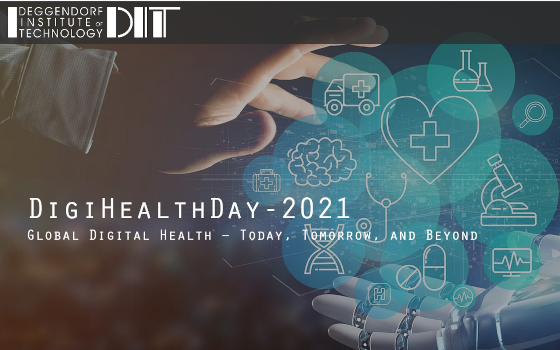The DigiHealthDay 2021 is an International Symposium with the theme "Global Digital Health - Today, Tomorrow, and Beyond". The abstracts pertaining to the field of digital health and its role in the context of 'Global Health' are invited. Participation in DigiHealthDay 2021 entitles to the publishing of one abstract and paper in the symposium proceedings and the Journal of the International Society for Telemedicine and eHealth (JISfTeH).
Following last year's success of the inaugural event DigiHealthDay™-2020, which was attended by a total of 348 registered participants from 59 countries around the world, this year's event will also be mostly virtual. The one day-long action-packed symposium will explore modern Digital Health and its role in tackling global health problems from a uniquely international perspective, with a special focus on Digital Health Education, and will include Keynote Talks by top German and international experts, an extremely interesting Panel Discussion on the "Future of Digital Health Data", as well as oral and poster scientific presentations, student thesis and project presentations, and (virtual) networking possibilities.
The following are topics that are of interest for DigiHealthDay 2021:
- EHR, Health Information Systems
- Data Standards and Interoperability
- Telemedicine and Remote Health Care
- mHealth, IoMT, and Telemonitoring
- Health Data Management and Analytics
- Artificial Intelligence in Medicine and Healthcare
- Privacy, Security, Trust, and Patient Engagement
- Robotics, Blockchain, New and Emerging Technologies
- Delivery Models, Bottlenecks, and Moving Forward
- DigiHealth Innovation and Entrepreneurship
- SPECIAL FOCUS on Digital Health Education
Submission of abstracts opening: 15 April, 2021
Abstract / paper submission deadline: 1 August, 2021
Notification of acceptance (on or before): 1 September, 2021
Author guidelines for full paper: https://journals.ukzn.ac.za/index.php/JISfTeH/about/submissions
Please address your inquiries to: This email address is being protected from spambots. You need JavaScript enabled to view it.
Submission of abstracts: https://survey.th-deg.de/index.php/925967?newtest=Y&lang=en
DigiHealth Workshops
DigiHealth is not just a one-day symposium - it is also a series of educational events hosted at DIT-ECRI in Spring and Summer 2021, all bound by the same theme – "How are digital technologies transforming health and care around the world", culminating in the DigiHealth Day on 12 November, 2021.DigiHealthDay-2021 pre-meeting VIRTUAL WORKSHOP SERIES will take place from April-July 2021.
For further information, please visit:
https://www.th-deg.de/digihealthday
DIT-ECRI – A Perfect Place for Digital Health Academia
The European Campus Rottal-Inn, ECRI (www.th-deg.de/ecri-en) was founded in 2015 as an international branch of the Deggendorf Institute of Technology, DIT (Technische Hochschule Deggendorf, THD www.th-deg.de); currently DIT is home to nearly 8,000 students from roughly 100 nations around the world. ECRI has about 1,000 students, and features two study programs in Digital Health - Bachelor of Health Informatics and Master of Medical Informatics (starting from October 2021 - Master of Digital Health, https://www.th-deg.de/dh-m-en).
